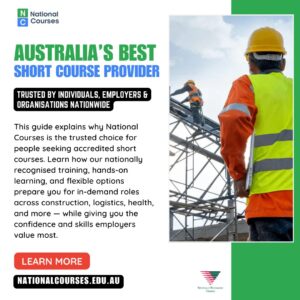No-Experience Railway Jobs in Australia: How to Get Hired and Certificates You Need
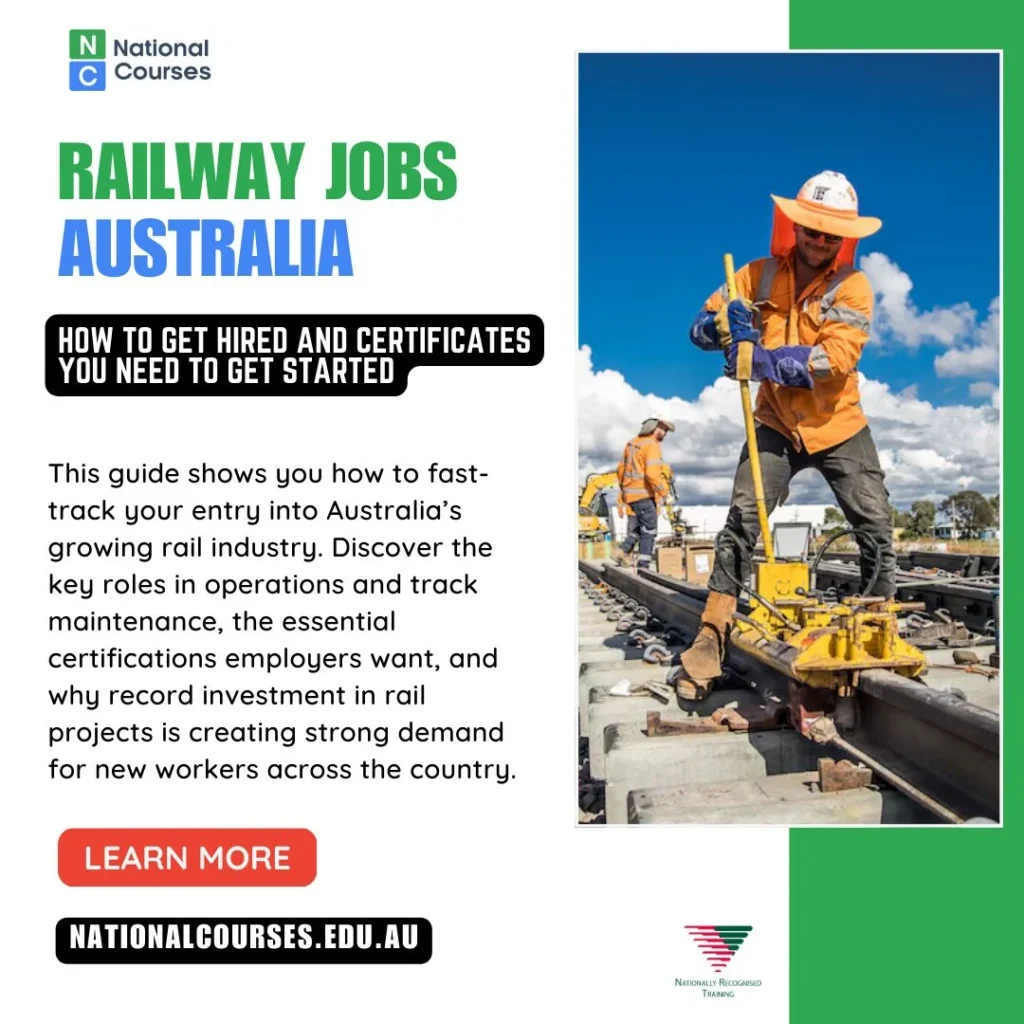
Key Takeaways
- Australia’s rail sector is booming: Billions are being invested into metro upgrades, regional freight links and major infrastructure projects, creating ongoing demand for skilled staff.
- Entry-level pathways available: Roles in track work, maintenance, signalling and safety support can be accessed with the right nationally recognised tickets.
- Certifications that make you job-ready: White Card, Rail Industry Worker (RIW) card, First Aid and other safety courses improve your employability.
- Strong career growth opportunities: Many entry-level staff progress into supervisory or specialised technical roles with additional training.
- Steady work and competitive pay: Infrastructure projects provide long-term employment stability and attractive wages across the rail industry.
Why the Australian Rail Industry is Hiring Beginners
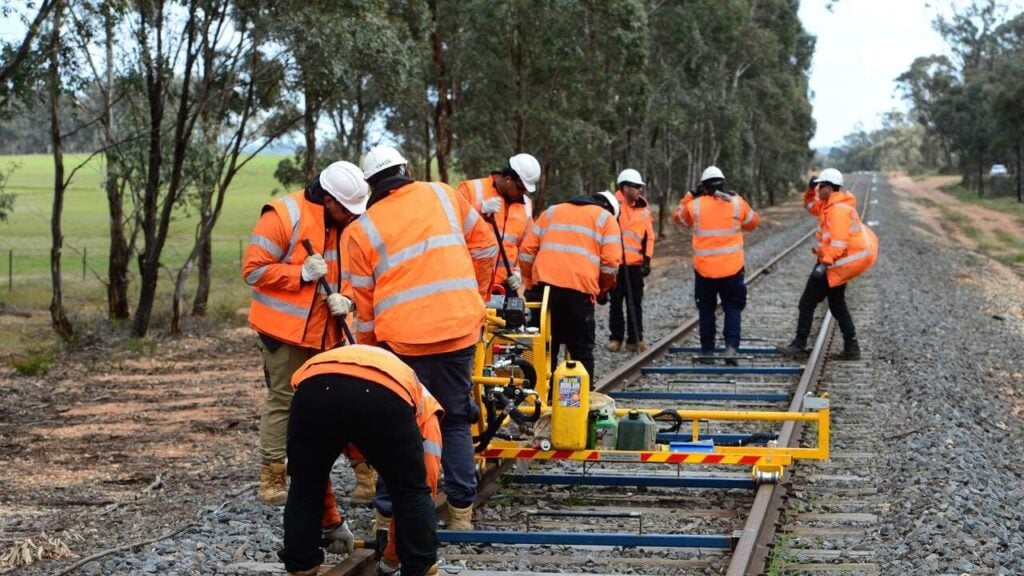
In the next few years, Australia’s rail sector will be investing massive amounts of money into metro upgrades, regional freight links and major infrastructure projects, creating ongoing demand for operational and maintenance staff.
The Australian government has committed more than AUD $155 billion to rail projects over the next 15 years — a clear signal that demand for new workers won’t be slowing down anytime soon.
This demand — combined with an ageing workforce and skills shortages — means many employers are now prepared to hire people with little or no prior rail experience.
For jobseekers this creates realistic entry pathways: casual or trainee roles that include great starting wages and clear progression routes into higher-paid, specialist positions.
Many roles also come with rostered shift patterns (including drive-in/drive-out arrangements), employer-provided PPE and site-based supervision while on-the-job training is completed.
Quick facts
- Large public and private rail projects drive steady demand for maintenance and operations labour.
- Employers commonly offer paid, nationally recognised training for entry-level recruits.
- Common entry pathways lead from casual/trainee roles into fixed-term or permanent positions after competency sign-off.
Trainer’s Insight:
“Employers increasingly advertise railway jobs as ‘no experience required’ because they’ll often provide on-the-job training for your specific role. If you turn up switched on and ready to learn, you can easily progress from an entry-level position into a more specialist role within 12–24 months.”
Certificates and Qualifications You Need to Get Hired as Railway Worker in Australia
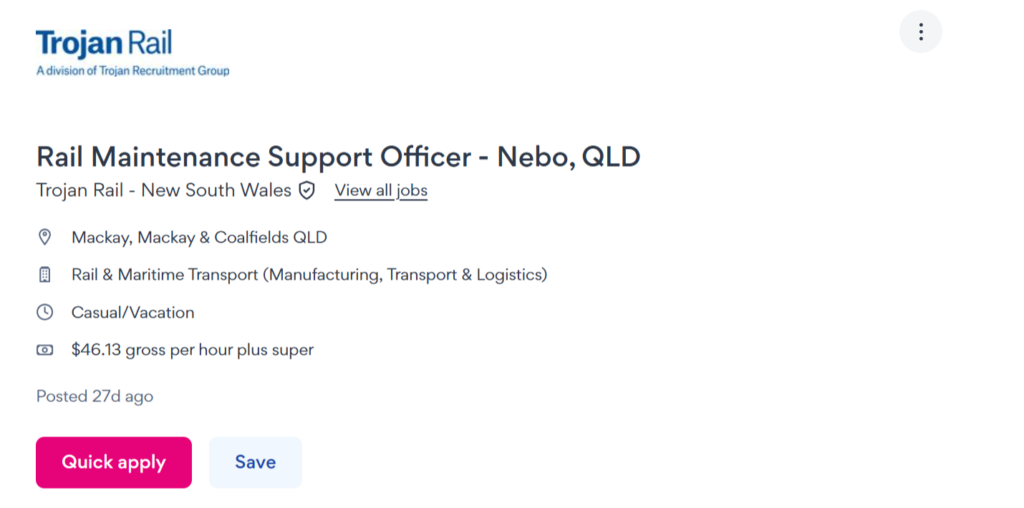
Below is a practical table of common entry-level rail roles and the core certifications you will need to get hired.
We focus on the essential credentials that employers actually ask for in no-experience job ads — the certifications that get you shortlisted and fast-tracked into further on-site training.
| Entry-Level Role | Core Courses to Complete | Recommended Extra Tickets / Short Courses | Notes / Why This Helps |
|---|---|---|---|
| Rail Maintenance Support Officer |
White Card; First Aid (HLTAID011); On-site Inductions |
Mobile Plant (basic); Forklift (if depot work); Working at Heights / Confined Space (if required) |
Covers site induction, emergency response and basic plant familiarity — makes you immediately deployable for maintenance crews. |
| Track Labourer / Track Worker | White Card; First Aid (HLTAID011) | Traffic Control (for road/rail interfaces); Manual Handling | Basic safety and first aid are essentials — Traffic Control helps where works interact with road traffic. |
| Railway Yard Team Member / Shunting Assistant | White Card; First Aid (HLTAID011) | Forklift; Mobile Plant; Manual Handling | Forklift and plant skills are often used in yards — plus first aid and White Card for compliance. |
| Rail Safety Lookout / Protection Officer (entry) | White Card; First Aid (HLTAID011) | Traffic Control (if site interfaces with roads) | Safety-focused training shows employers you understand exclusion zones, signalling warnings and emergency response. |
| Rail Construction Labourer | White Card; First Aid (HLTAID011) | Scaffolding; Working at Heights; Confined Space (if required) | Construction Safety and White Card are often minimums for large civil rail projects. |
| Depot / Workshop Support (entry) | White Card; First Aid (HLTAID011) | Forklift; Mobile Plant; Fire Safety | Depot roles often require forklift and manual handling skills alongside basic safety training. |
Important note: Some rail-specific accreditations — for example RIW (Rail Industry Worker) card, or employer-specific site inductions — are administered by rail authorities and employers.
National Courses focuses on the core, nationally recognised short courses that make you eligible for these roles; these are the practical pre-requisites most employers insist on before they sponsor rail-specific accreditations or advanced training.
Trainer’s Insight:
“Employers typically shortlist candidates who already have a White Card and a current First Aid certificate. Add one mobile plant or traffic control ticket and you’ll instantly be considered for a wider range of entry-level roles.”
What Railway Employers Are Looking For (Even Without Experience)
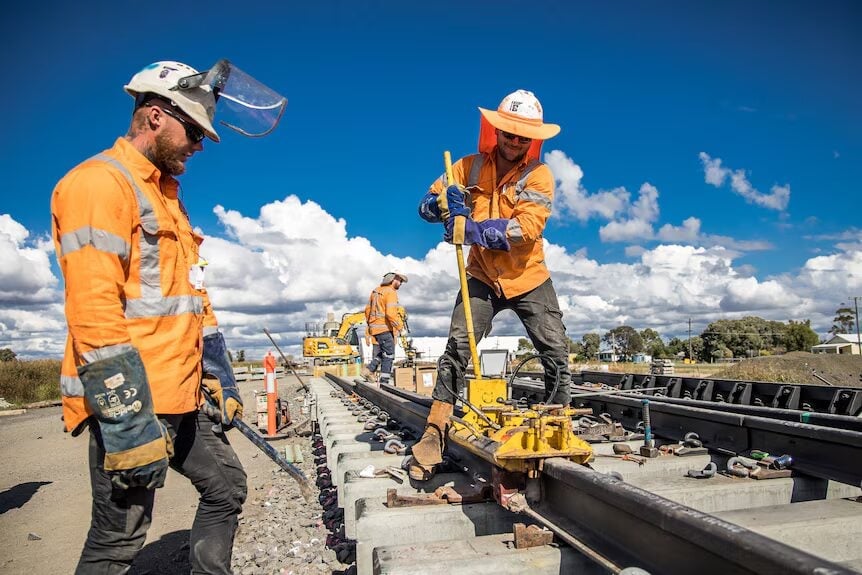
Most entry-level job ads in rail, construction, and infrastructure highlight the same core requirements.
Even without direct experience, employers value candidates who are prepared, safety-focused and eager to learn.
- Full driver’s licence: Essential for accessing remote worksites and flexible shift schedules.
- Ability to pass a Category 1 Rail Medical: Includes fitness, drug and alcohol testing to ensure you’re fit for safety-critical work.
- Willingness to work shifts and outdoors: Projects often run 24/7 and in varied conditions.
- Safety-first mindset: Employers prioritise candidates who understand and respect WHS (Work Health and Safety) standards.
- Soft skills: Reliability, communication skills, teamwork and a willingness to learn can set you apart.
Trainer’s Insight
"Soft skills often matter more than technical experience when first starting out. Employers look for people who show up on time, listen to instructions, and work safely. Certifications like White Card, First Aid and Traffic Control can give you an extra edge – but your attitude and commitment are what really matter most when you are first getting started".
Pay, Career Progression and Lifestyle
Entry-level rail and construction roles are more than just a foot in the door – they’re the start of a long-term career.
Many employers offer full-time, fixed-term and even permanent positions once you’ve proven yourself on site.
- Pay progression: Wages typically increase as you gain more tickets, complete Verifications of Competency (VOCs) and hit training milestones such as earning additional certifications.
- Career development: Starting out as a labourer or track worker can lead to steady work in supervisory roles, safety officer jobs, mobile plant operations or as a specialist technician as your skills and qualifications grow.
- Lifestyle benefits: Many rail and infrastructure jobs offer drive-in/drive-out or fly-in/fly-out rosters with accommodation and meals provided. This can mean more stable rosters, predictable income and long-term job security.
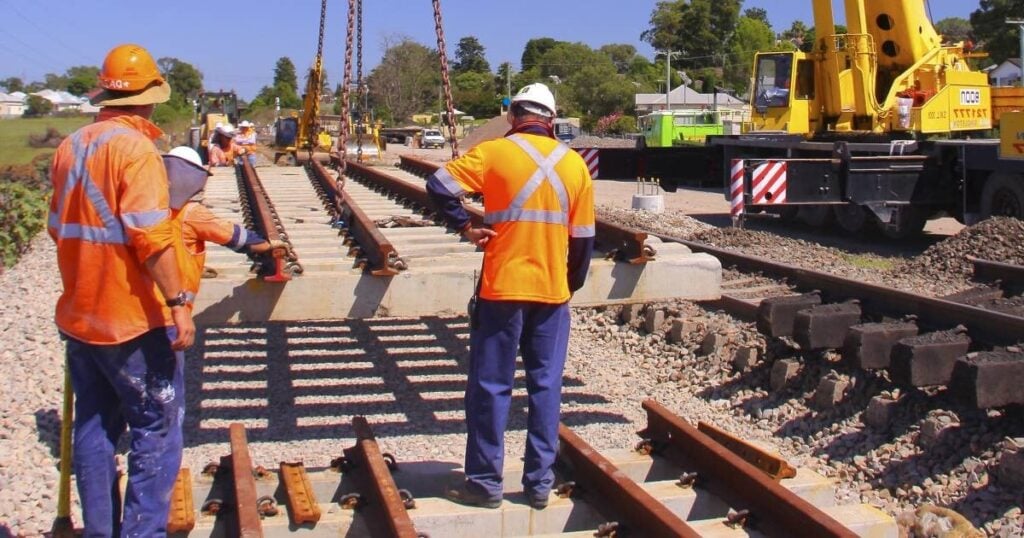
Tips for Landing Your First Rail Job
Breaking into the rail industry without prior experience can happen fast if you’re certified, proactive, and prepared.
Use the checklist below to stand out to Australian railway employers.
| Tip | Why It Matters | How to Action It |
|---|---|---|
| Apply early for clearances | Police checks, rail medicals and drug/alcohol testing can take weeks to finalise. Being pre-cleared signals you’re serious and job-ready. | Start applications for your National Police Check and Category 1 Rail Medical before applying for jobs. |
| Highlight transferable skills | Construction, labouring, logistics, warehousing or machinery experience shows practical capability and reliability. | Add these to your résumé and explain how they link to rail work (teamwork, safety awareness, physical stamina). |
| Be flexible | Willingness to work shifts, nights, weekends or different locations makes you more attractive to employers struggling to fill rosters. | State your availability clearly in applications and be open to short-term or drive-in/drive-out arrangements. |
| Show your certifications | Entry-level safety tickets prove you’re site-ready and compliant from day one. | List certifications such as White Card, Traffic Control, First Aid, or equipment training from National Courses. |
| Build your network | Many rail jobs are filled through labour-hire agencies or word of mouth. | Register with multiple agencies and attend industry info sessions or pre-employment briefings. |
Trainer’s Insight
“We regularly see new starters who’ve never set foot on a rail site get picked up quickly because they’ve done the basics first — police check, rail medical, and a couple of safety tickets. It’s not about being the most experienced; it’s about being the most ready. Those who show up prepared and adaptable are often hired before people with years in other industries.”
Frequently Asked Questions (FAQ)
1. Do I need prior rail industry experience to get hired?
No. Many entry-level rail and construction roles are designed for people without industry experience. Employers look for safety awareness, reliability and willingness to complete mandatory training like a White Card or Rail Industry Worker card.
2. What is a Rail Industry Worker (RIW) card and why is it important?
The RIW card is a national competency management system for rail workers. It stores your qualifications, medicals and inductions in one place, proving you’re compliant and site-ready. Most rail employers require it before you start work.
3. How long does it take to complete the essential safety training?
Courses like the White Card or basic First Aid can often be completed in one day. Other tickets, like Traffic Control or Mobile Plant operation, may take longer depending on the level and assessment requirements.
4. Will employers pay for my training or do I pay myself?
It depends on the employer. Some companies reimburse training costs after probation, while others expect you to have essential tickets already. Investing in at least one or two key courses upfront can make you more competitive.
5. Do I need a full driver’s licence?
Yes, most entry-level rail jobs require at least a provisional or full licence because worksites are often in remote areas and not serviced by public transport. A reliable vehicle can also be a big advantage.
6. How do rosters and shifts usually work?
Rail and infrastructure projects often run on rotating shifts, including nights and weekends. Some operate on drive-in/drive-out or fly-in/fly-out rosters with accommodation provided. Flexibility increases your job prospects.
7. What medical checks will I need?
Most rail roles require a Category 1 or 3 Rail Medical. This covers vision, hearing, mobility, and drug and alcohol testing to ensure you’re fit to work safely in high-risk environments.
8. Can I move into higher-paying roles once I start?
Yes. Many workers begin as labourers or track workers and progress into plant operation, supervision or safety roles. Every extra certification you gain (like EWP, Forklift, Traffic Control) can lead to higher pay rates.
9. How can I stand out to recruiters?
Submit a clear, concise resume that lists your certifications, highlight your reliability, and include references. Showing up on time for interviews and inductions also makes a strong first impression.
10. Are there age limits for rail or construction jobs?
Most roles have no upper age limit as long as you meet the fitness and medical requirements. Employers value maturity, consistency and a safety-first approach at any age.
Ready to Start Your Rail Career?
Australia’s rail sector is growing fast. Major infrastructure projects, new freight corridors and ongoing maintenance works are creating thousands of entry-level jobs across the country.
Employers are looking for reliable, safety-conscious people who are ready to step on site and get started.
This is where National Courses comes in.
Our nationally recognised training gives you the essential certifications that employers demand — the kind of tickets that can turn an application into a start date.
From your White Card and First Aid to Traffic Control and Mobile plant tickets, we deliver the credentials that open doors to rail and infrastructure jobs.
- Get nationally recognised qualifications that make you stand out to recruiters.
- Learn from experienced trainers who understand rail and construction requirements.
- Complete the essential safety and compliance courses that employers prioritise.
- Step onto worksites with confidence and a clear path to progression.
Every course you complete adds to your qualifications in the Rail Industry Worker (RIW) system and demonstrates to employers that you’re serious, safety-ready and prepared for the demands of the job.
Take the First Step Today
Start building the foundation for a stable, well-paid career in the Australian railway industry.
Whether you're looking to get your first ticket or a full set of nationally recognised credentials, our government-approved training gives you the edge you need to land your first railway worker job and progress quickly.
About National Courses
Nationally Recognised Training and Certification for a Wide Range of Industries

National Courses Pty Ltd (RTO 41072) is a trusted training provider offering short, nationally recognised courses across Australia.
We specialise in practical, job-ready training for industries like construction, civil, safety, and first aid — helping individuals and businesses stay qualified and competitive.
National Courses PTY LTD works with government programs, employers, and community organisations to deliver training that leads to real employment outcomes.
On This Page
- Why the Australian Rail Industry is Hiring Beginners
- Certificates and Qualifications You Need to Get Hired
- What Employers Are Looking For (Even Without Experience)
- Pay, Career Progression and Lifestyle
- Tips for Landing Your First Rail Job
- Frequently Asked Questions (FAQ)
- Ready to Start Your Rail Career?
- Take the First Step Today



